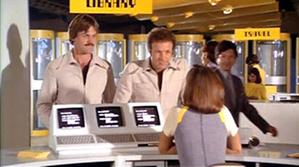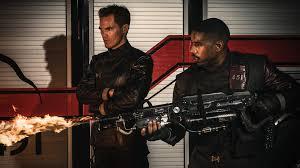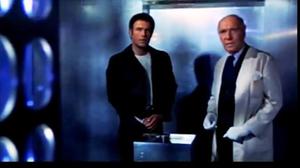"We are still chasing those magical, fractal, visceral encounters with real libraries of real books." --Stuart Kells, in a Paris Review blog post titled "The Strange Magic of Libraries"
It's National Library Week, which has somehow reminded me of the 1975 film Rollerball, set in "the not too distant future" of 2018. Based on William Harrison's short story "The Rollerball Murders," the movie features a pair of library scenes that have stayed with me for more than four decades.
Rollerball imagines a corporate-controlled world in which the human instincts for competition and violence are tightly wrapped up in a single, deadly spectator sport designed to illustrate the futility of individual effort. In his New York Times review, Vincent Canby snarled: "If a man's science‐fiction is a measure of his imagination, then Rollerball suggests that Norman Jewison's is about the size of a six‐pack of beer and a large bag of pretzels."
Rollerball superstar Jonathan E. (James Caan) has probably never read the Canby archives, but he has been infected with a potentially fatal virus--curiosity. Confronting forced retirement, he begins to wonder how the hell his world got to this point. It's an unexpected moment of introspection from an otherwise action-oriented guy and propels him down a dangerous path, which just happens to include a couple of library visits.
 At his local "library," he encounters a vacant-eyed Circulation Unit clerk:
At his local "library," he encounters a vacant-eyed Circulation Unit clerk:
Jonathan: Yeah. I tried to order some books and they sent me this notice that I had to appear here at the center personally.
Clerk: That's right. This is our circulation unit. You can make your choice here or by catalogue. There must be some mistake. The books you've ordered are classified and have been transcribed and summarized.
J: Who summarized them?
C: I suppose the computer summarized them.
Moonpie (friend & teammate): What do you need books for?
J: I just want to study up on some things.
C: You could go to the computer center where the real librarians transcribe the books, but we have all the edited versions in our catalog, anything I think you'd want.
J: Well, let's see then. This is not a library, and you're really not a librarian.
C: I'm only a clerk, that's right. I'm sorry about it, really.
J: And the books are really in computer banks being summarized. Where is that?
C: There's a computer bank in Washington. The biggest is in Geneva. That's a nice place to visit. I guess that's where all the books are now.
 My Rollerball flashback may also have been sparked by the release of HBO's official trailer for Fahrenheit 451 (recurrent theme: bad times for book people in the future). In an interview with Deadline, director Ramin Bahrani said that when Ray Bradbury wrote his novel in the 1950s, it was set in the distant future, and today people can read books on a "super computer in your pocket.... It's not hard to control what is on the Internet given that things are so centralized.... Bradbury said we asked for this. We asked for things to become this way.... We've turned it all over to Google, Facebook and the government. We decided we don't want to have any part in that. We've willingly given it up."
My Rollerball flashback may also have been sparked by the release of HBO's official trailer for Fahrenheit 451 (recurrent theme: bad times for book people in the future). In an interview with Deadline, director Ramin Bahrani said that when Ray Bradbury wrote his novel in the 1950s, it was set in the distant future, and today people can read books on a "super computer in your pocket.... It's not hard to control what is on the Internet given that things are so centralized.... Bradbury said we asked for this. We asked for things to become this way.... We've turned it all over to Google, Facebook and the government. We decided we don't want to have any part in that. We've willingly given it up."
I kept reading... on my computer.
In Holland last year, the Charles Nypels Laboratory made a heat-sensitive edition of Fahrenheit 451, featuring pages that "are covered in what appears to be a soot-black, screen-printed layer. Words are only revealed when a high temperature is applied."
The Ambient Literature Project was established in 2016 "to investigate the locational and technological future of the book." In the Bookseller, Tom Abba observed: "The authorial address of The Cartographer's Confession, in which an unreliable narratorial voice from thirty years ago merges with the city around you in 2018 has specific registers, ways of linking place to voice to personal experience. That the ghosts in Breathe break down the fourth wall of the reading experience is a particularly subtle use of API data, designed to unnerve each reader."

J: What about the books?
L: Books, books, oh no, they're all changed, all transcribed. All information is here. We've Zero, of course. He's the central brain, the world's brain. Fluid mechanics, fluidics. He's liquid, you see. His borders touch all knowledge. Everything we ask has become so complicated now. Each thing we ask. This morning we wanted to know something about the 13th century. It flows out into all our storage systems. He considers everything. He's become so ambiguous now. As if he knows nothing at all."
In the introduction to my copy of Fahrenheit 451, Neil Gaiman writes that once upon a time, Bradbury crafted "The Fireman," a short story that "demanded to be longer. The world he had created demanded more. He went to UCLA's Powell Library. In the basement were typewriters you could rent by the hour, by putting coins into a box on the side of the typewriter. Ray Bradbury put his money into the box and typed his story. When inspiration flagged, when he needed a boost, when he wanted to stretch his legs, he would walk through the library and look at the books."
Despite dire predictions--real as well as fictional--the libraries of my past, present and future still inspire "magical, fractal, visceral encounters." I'm glad they do.

